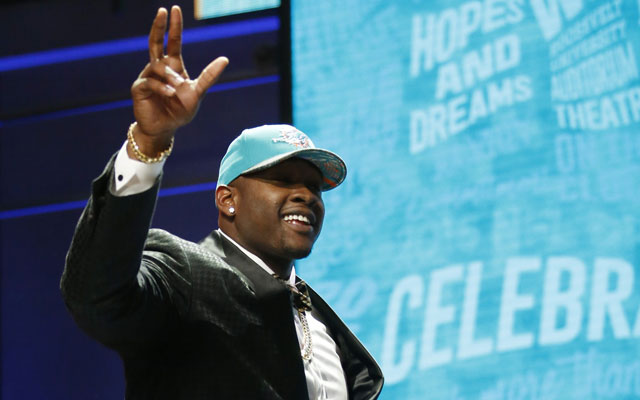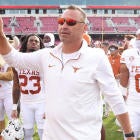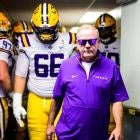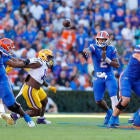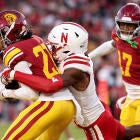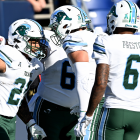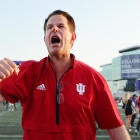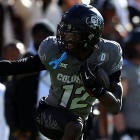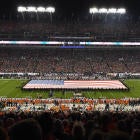When Ole Miss signed a surprising top-10 recruiting class three years ago, the question of how the Rebels, such a downtrodden program at the time, were accomplishing that feat started circulating. The whispers became so loud that Ole Miss coach Hugh Freeze unusually took to social media five days before National Signing Day and challenged anyone to come forward with information about alleged violations.
“If you have facts about a violation, send it to compliance@olemiss.edu,” Freeze posted on Twitter on Feb. 1, 2013. “If not, please do not slander these young men or insult their family.”
Just last month, Freeze doubled down in a conversation with CBS Sports' Dennis Dodd. “Come and see. Open invitation,” the coach said, offering anyone the opportunity to inquire into his program's practices. "The perception out there and the narrative of all this pay-for-play that is, in my opinion, very inaccurate," he added.
Three years after Freeze's tweet, with Ole Miss in the midst of an NCAA investigation, one of the Rebels' three five-star players recruited that year claimed his social media accounts got hacked while he was sitting in a green room live on national television. The supposed hacker went on to post “facts” on these social media accounts, and one of those very players Freeze defended admitted he took money from an Ole Miss staffer in a post-draft interview.
The surreal Laremy Tunsil saga from the NFL Draft (where he wound up taken No. 13 overall by the Miami Dolphins), typically a celebration for schools and their selected players, turned into a potential NCAA disaster for Ole Miss with the entire nation watching along.
By now, you know the details. Someone apparently hacked Tunsil’s social media accounts in a viciously-timed attack to hurt him on draft night. First, Tunsil's Twitter account showed a video of him smoking marijuana in a gas mask bong. He tumbled in the draft. After being selected by the Miami Dolphins at No. 13 overall, Tunsil's Instagram account posted a screenshot of an alleged text message conversation between Tunsil and Ole Miss director of football operations John Miller about Tunsil getting his and his mother's bills paid.
Ole Miss could have blown that off to the NCAA as being a fake conversation, and the Rebels may still try that defense. Unfortunately for the Rebels, after initially denying he was paid by a coach when asked about the Instagram hack at an NFL Draft press conference, Tunsil added, “I made a mistake. That happened.”
When pressed if that reply meant he had indeed taken money from a coach, Tunsil said, “I’d have to say, yeah.’”
Cue the fire alarm in Oxford, Mississippi. Tunsil’s comments appeared to give credence to what is implied in the text message conversation posted on Tunsil’s Instagram account. In those screenshots, Tunsil appears to have directly asked Miller for money to pay his own rent and his mother’s $305 electric and water bill.
When Tunsil allegedly asked Miller for rent money, the screenshot with Miller's name said for Tunsil to “see Barney next week,” apparently a reference to Ole Miss assistant athletic director for high school and junior-college relations Barney Farrar. Miller also expressed his surprised at the $305 amount for Tunsil’s mother.
“I thought we all agreed on an [amount] -- that number keeps changing,” Miller appears to have written. “Someone needs to explain [the] exact cost -- I have no way of handling surprise amounts.”
This is potentially bad news for Ole Miss, which has been involved in an ongoing case with the NCAA for several years over impermissible benefits. There needs to be a qualifier that this is “potentially” bad news because, with the NCAA, who knows what it can actually prove?
Now that Tunsil is in the NFL, it could be much harder for the NCAA to compel him to cooperate as freely as he started to do Thursday before an assistant of Tunsil’s agent, Jimmy Sexton, shut down the press conference questions. Sexton happens to be the agent for both Tunsil and Freeze. The press conference ended before Tunsil could answer whether he has spoken with the NCAA.
In the world of NCAA enforcement, there are no slam dunks, even if a player publicly admits he got paid. Former North Carolina basketball star Rashad McCants once told the world that tutors wrote his term papers, he rarely went to class for half his time in college, and he stayed eligible largely by taking bogus classes. This week, the North Carolina men’s basketball team was removed from the NCAA’s most recent notice of allegations in that case.
Ole Miss can deny, deny, deny and use smart lawyers to find ways around NCAA bylaws. Or the NCAA may have enough on Ole Miss to make it stick. It’s a coin flip with NCAA enforcement.
Let’s stop with the narrative, as put forward by ESPN’s Todd McShay, that Tunsil sold out his Ole Miss coaches by supposedly telling the truth to the media. This thinking sums up what’s wrong with the negative stigma created by the NCAA about amateurism. In McShay’s mind, it’s better to lie publicly than to be honest when caught about getting paid. Only in college sports is this line of thinking acceptable. The NFL couldn't care less about Tunsil getting paid.
It’s time for my obligatory reminder that news of college players getting paid under the table is neither shocking nor worth taking a moral high ground. This happens far more often than people want to believe -- imagine if the federal government ever went after tax evasion for these under-the-table payments -- yet fans keep passionately watching the college games whenever a story like this comes out.
There’s a large underground market for players because they have more value than their scholarship provides and the NCAA forbids them from reaching that value. But because there’s an “NCAA rules are NCAA rules” element to this story, the potential fallout to Ole Miss is obviously relevant to follow.
Lost in the Tunsil news was the bombshell earlier Thursday night by The Tuscaloosa News that Alabama defensive line coach Bo Davis will be fired or forced to resign due to potential rules violations. It’s not every day you see that headline involving a defending national champion. Davis has spent many years on Nick Saban's staff at various stops.
Yet Tunsil’s surreal saga managed to overshadow that report. It was that bizarre. A statement by Ole Miss appeared to suggest that Tunsil allegedly getting paid by a staffer is new to the ongoing NCAA investigation against the university.
“The University is aware of the reports from the NFL Draft regarding Laremy Tunsil and potential NCAA violations during his time at Ole Miss,” the university said in a statement. “Like we do whenever an allegation is brought to our attention or a potential violation is self-discovered, we will aggressively investigate and fully cooperate with the NCAA and the SEC.”
The NCAA declined to comment on the latest Tunsil twist.
Ole Miss said last week another undisclosed party in its ongoing NCAA case received a 30-day extension to respond to the notice of allegations from last fall. Yahoo Sports previously reported the notice contained about 30 alleged violations in football, women’s basketball and track and field. Some of the allegations relate to Tunsil, who was suspended for seven games in 2015 for impermissible benefits he received.
All these months later and Ole Miss has still not publicly released the notice of allegations. Media outlets have attempted to obtain it through open-records requests.
“One of the other parties to the NCAA Notice of Allegations has requested and received a 30-day extension to respond to the notice,” Ole Miss said in a statement on April 22. “This extension is an often used tool available to all parties, and the Notice of Allegations itself has not changed in any way. Upon the completion of the 30-day extension period, the University will release our full Response to the Notice of Allegations.”
It’s long past time for Ole Miss, a public university, to deal publicly with its NCAA allegations. At this point, the notice can’t be much worse than what happened publicly Thursday night.
Three years ago, Ole Miss crashed college football’s party by turning heads with the signings of Tunsil, Robert Nkemdiche and Laquon Treadwell. The Rebels had rarely competed for the nation’s best recruits and suddenly they were landing five-star players from Georgia, Illinois and Florida.
Non-traditional programs who win big quickly always draw raised eyebrows. Freeze challenged anyone to turn in facts of NCAA violations. Bizarrely, one of his own players did Thursday night.
It’s the bookend to a wildly successful three years in Oxford that could damage the Rebels moving forward.
Follow and read more from Jon Solomon on Facebook and Twitter.
